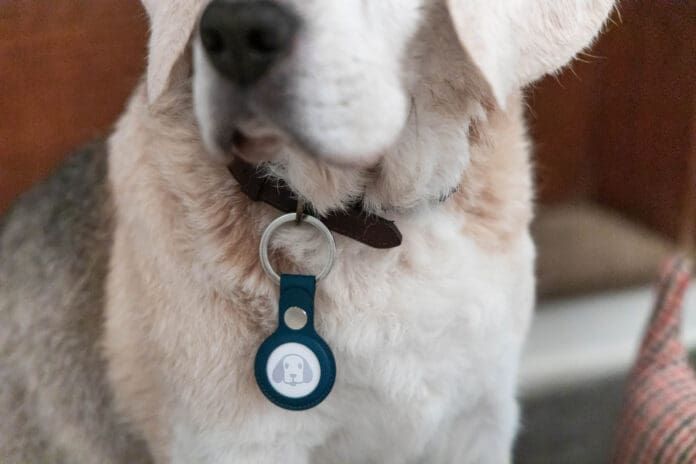Dog tracking devices attach to a dog’s collar or harness, collect data related to the dog’s location, and transmit data to a smartphone or computer. That’s useful, but as explained in “Sorting Out Smart Collars,” some dog-tracking GPS (Global Positioning System) devices offer so many options that their features and price tags can overwhelm new users.
If you’re new to GPS technology and want a simple, affordable, reliable way to keep track of your dog’s location, here are some options.
Note that your dog’s microchip is not a tracking device. The microchip is a radio-frequency identification (RFID) implant that serves only one purpose, to identify dogs by matching chip identification numbers to veterinary records.
The Simplest and Least Expensive Dog Tracking Devices
Ever since Apple released its AirTag Tracking Device to keep track of luggage and other items, people have attached AirTags to their dogs. According to Apple, this is a terrible idea whose risks outweigh the rewards because someone finding your pet would need an updated iPhone to notify you and they might not have one, or they might not know how to use their phone for that purpose, and some dogs have swallowed AirTags, requiring emergency surgery. AirTag fans dismiss Apple’s warnings as efforts to avoid liability, and dog collars and harnesses designed to hold AirTags are widely sold.
Considering its $29 price tag, long battery life, the fact that it doesn’t require a subscription, and its ease of use, the AirTag looks like an attractive option. However, it’s far less reliable than a GPS tracker that uses satellite signals and cellular data to send your dog’s location to your phone. The AirTag uses Bluetooth technology, which works well if you’re within 30 to 100 feet of the device. Otherwise, Apple’s app depends on the proximity of other active iPhones in Apple’s “Find My” network to expand the AirTag’s range. If anyone with a modern Apple device is near a lost AirTag, they can alert the AirTag’s owner of the exact location, but if iPhone users aren’t nearby, the AirTag can’t respond..
Similar descriptions apply to the Tile Pro tracker, designed to keep track of keys, phones, luggage, and other items. Unlike Apple, Tile promotes its tracker for use on pets and even offers a Tile collar attachment for cats. The basic Tile costs $34.99 and requires an annual $29.99 (standard) or $99.99 (premium) subscription. Its 400-foot Bluetooth range can be extended by proximity to other active cell phones in the Tile Network, which is why it’s more reliable for indoor cats than for out-of-range dogs.
The Pawscout Bluetooth Tracker relies on a network of Pawscout members and their smartphones to reunite tagged pets with owners. Its 300-foot range is expanded by proximity to other people with the Pawscout app, which makes this tag most effective in urban areas. If there aren’t any active Pawscout apps within range, the tracker can’t respond. Pawscout’s QR tag ($9.95) and Bluetooth tracker ($19.95) don’t require subscriptions.
User-Friendly GPS Trackers
If you live in a rural area, hike or camp with your dog, or if identifying your dog’s exact location matters, it makes sense to invest in a GPS tracker. Most use a combination of Wi-Fi and Bluetooth to share satellite data with your phone. While ease of use is important, so are factors like reliability, affordability, battery life, whether the tracker is waterproof, and whether it’s comfortable for your dog to wear.
The Whistle GO Explore Pet Tracker attaches to the collars of dogs weighing 25 pounds and more. Praised by evaluators for its ease of use, sturdy attachment clip, and for being waterproof, the Whistle costs $129 plus an annual subscription of $99.
The Tractive GPS Dog Tracker is easy to set up, popular with users, works for dogs weighing as little as 9 pounds, and provides up-to-the-second updates of a dog’s position. The Tractive is waterproof, monitors a dog’s sleep patterns and daily activities, and costs $49.99 with a basic ($96) or premium ($108) annual subscription.
The Jiobit Smart Tag Dog Tracker is the smallest GPS tracker, suitable for dogs and cats of all sizes. The tag’s different clips make it easy to attach, and it’s easy to set up and use. The tag costs $129.99 and requires a $17 per month subscription ($8.33 per month or $100 if prepaid annually).
The Fi Smart Series 3 Dog Collar has a built-in tracker with a long battery life (1-1/2 to 2 months for most dogs) and upgraded location tracking for accuracy. The collar’s cost depends on the subscription purchased with it ($189.00 for prepaid annual subscriptions). Reviewers call it easy to set up and use.
The Cube GPS Pet Tracking Bundle uses GPS, WiFi, cell tower triangulation, and Bluetooth for location reporting, and it works nationwide off the Verizon network. This means that in areas with poor cell service, it can be unreliable. The pet tracking bundle costs $119.95 plus an annual subscription for $198.00.
Looking for More?
Before deciding on a dog tracker, take a realistic look at your needs and visit websites and check online reviews. Compare the area ranges of different devices, their battery life, and costs. If these are of interest, look at extra features like activity monitors, built-in LED lights for extra visibility, and the ability to add multiple phones (yours, your family’s, or a pet sitter’s) to your tracker’s notification system.
For our latest in-depth review of dog tracking products see “GPS Trackers and Smart Collars for Dogs.”
Keep Your Dog’s IDs Up to Date
Even if you buy the most advanced tracking device for your dog, it’s important to keep her collar ID and microchip information up to date. There are many reasons why a tracking device might stop working, so backup identification methods still matter.







This article makes me sad; reason being that tracking technology, GPS send electromagnetic fields (EMF’s), radio waves; harmful and unhealthy for both canines and humans. Can’t imagine using such a device on my beloved dogs, let alone wonder what sort of cellular or otherwise harm it’s causing to their bodies. Same goes for cellular phone radiation. Disappointed to see the author promote this.